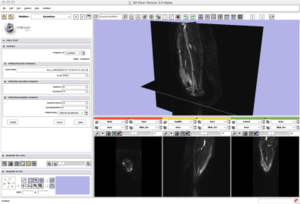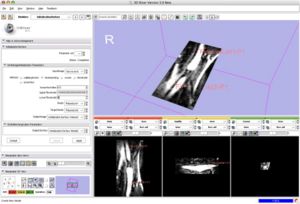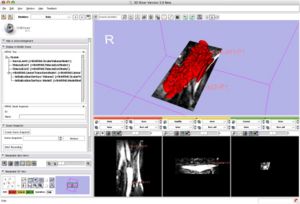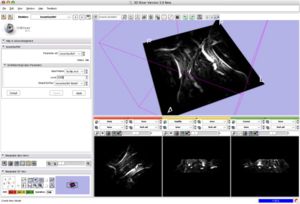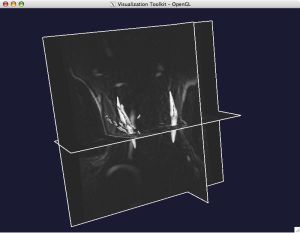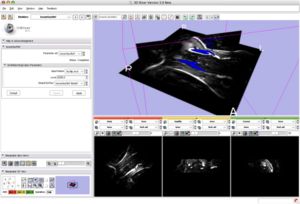Collaboration/VMTK
 Return to Project Week Main Page |
Key Investigators
- Mario Negri Institute: Luca Antiga
- GE: Dan Blezek, Jim Miller
- Isomics: Steve Piper
Objective
Integration of vmtk (vmtk.sourceforge.net) into Slicer3 (ground work already done in SLC).
- solve last issues with consistency of reference systems and generate a bunch of vmtk CLI modules
- exploit Python in Slicer3
Approach, Plan
A few issues still exist, mainly associated with the fact that vmtk is vtk based, and thus it is not MRML aware. Problems are described here. Solving coordinate system consistency issues will benefit from the interaction with the MRML scenes for the Execution model project.
Following the recent introduction of Python in Slicer3, it is in principle possible to use vmtk directly from Slicer's Python shell. This is would be a nice alternative to calling vmtk from the command line (vmtk is primarily a Python module) as it would save I/O operations. The idea is to create a general Python Execution model. A Python class would be required to have
- a method that spits out the description of the instance variables to be exposed on the GUI, the CLI module way (in this case, instance variables could be wrapped vtk objects or wrapped MRML nodes)
- a standard method (e.g. Execute()) that runs the class main functionality
Slicer would take care of building the GUI and setting the state of the object on the basis of the XML description before calling Execute.
Progress
June 2007 Project Week
Full-fledged CLI GUIs can be generated automatically, now including radio button-based choices and numeric ranges.
With small modifications to Slicer's CommandLineModule infrastructure (not committed yet), Slicer can now spit images in a "localized" coordinate system aligned with XYZ axes. This is useful for VTK-based code that is not RAS aware but instead uses vtkImageData (with no transform information attached). Input fiducials, ROIs and models are transformed to the localized coordinate system before being sent to the command line. After the execution, Slicer loads the results transforming them back to RAS.
This greatly simplified the interaction between vmtk and Slicer and will be potentially useful to other projects for integrating existing non-RAS aware code in Slicer.
References
http://villacamozzi.marionegri.it/~luca/vmtk/doku.php?id=vmtk:screenshots
